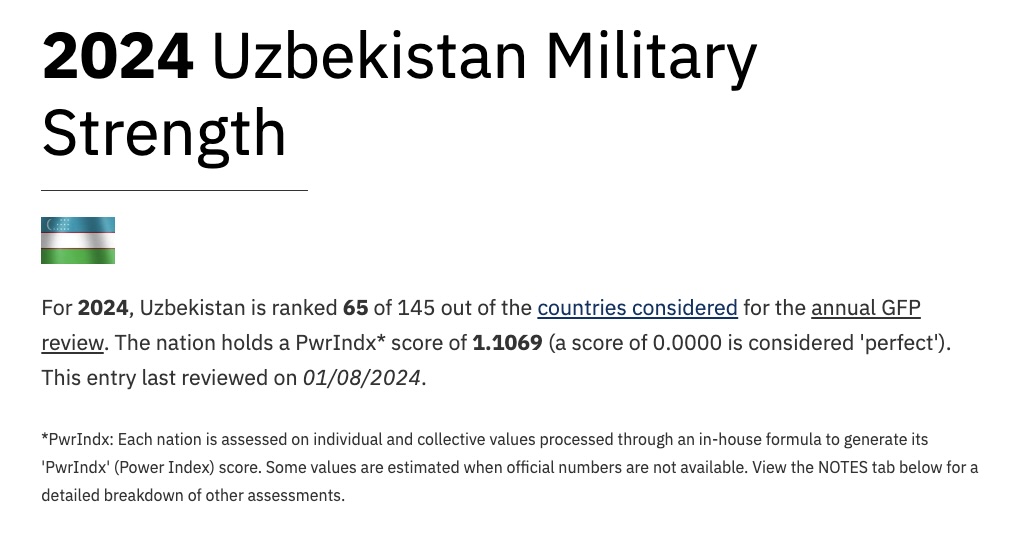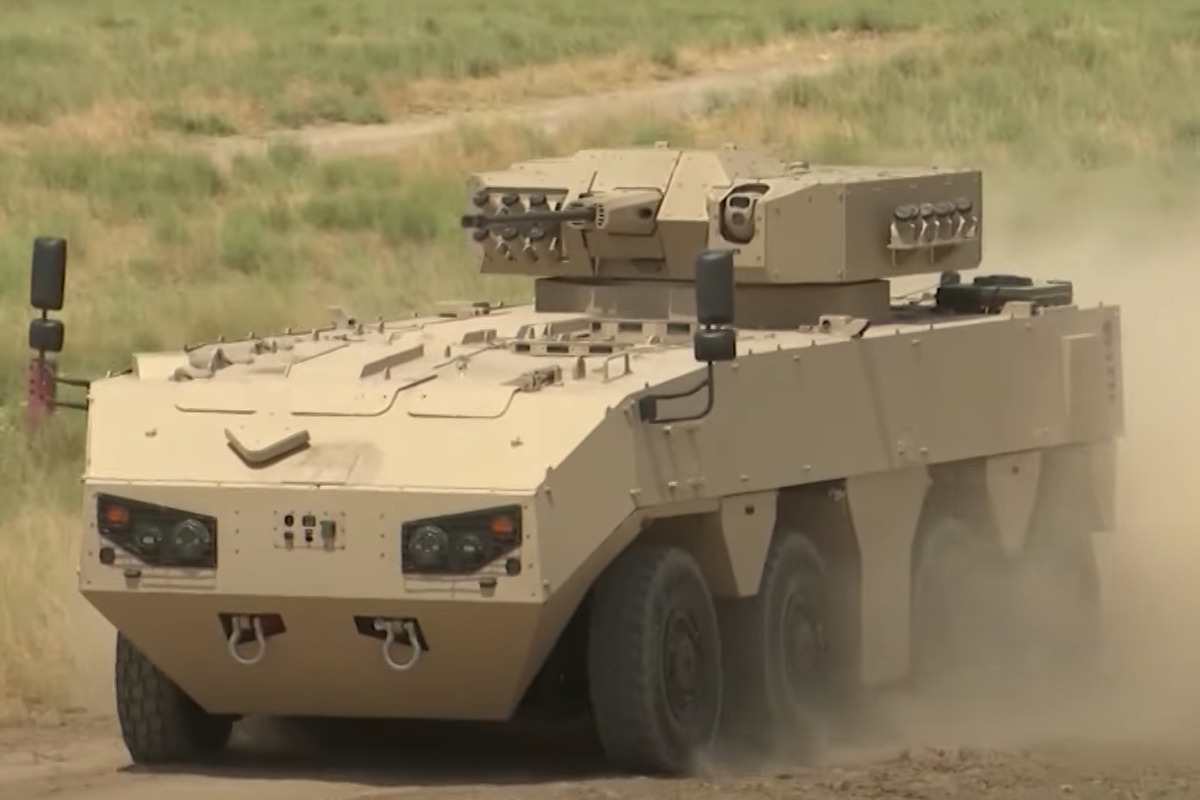As global tensions rise with ongoing conflicts in Ukraine and the Middle East, the military readiness and capabilities of nations near these regions are becoming more pressing concerns. Uzbekistan, a landlocked country strategically positioned in Central Asia, is often underestimated in global military assessments. In particular, rankings such as the Global Firepower Index (GFP) fail to fully capture the true military potential of this nation, leaving its strategic assets and defense capabilities underappreciated. This analysis, originally published by Defense.info and written by Mirshohid Aslanov, founder of the Center for Progressive Reforms in Tashkent, reassesses Uzbekistan’s military strength, highlighting overlooked factors and presenting a clearer picture of the country’s defense potential.

The Limits of Global Firepower Index (GFP) Rankings
The 2024 GFP assessment placed Uzbekistan 65th globally, down from 62nd in the previous year. The country also lost its top spot in Central Asia, according to the index. However, the GFP’s methodology, which takes into account manpower, finances, equipment, and resources, presents a skewed picture. Uzbekistan’s military strength cannot be fully understood without considering several crucial aspects that are either overlooked or misrepresented in global assessments.
Reserve Forces: A Critical Overlooked Asset
One of the major oversights in the GFP rankings is the country’s vast reserve forces. Contrary to GFP’s claim that Uzbekistan lacks reserve personnel, the law in Uzbekistan mandates that all men aged 18 to 35 who are fit for service are required to serve in the reserves. This translates to an estimated 10mn individuals, although even after factoring in health and employment restrictions, at least 5mn citizens remain available to be called up in times of conflict. This vast reserve force provides Uzbekistan with a significant strategic advantage, allowing the nation to sustain its defense capabilities during prolonged engagements or crises.
Active Troops and National Guard Contributions
While the GFP estimates Uzbekistan’s active troops at 48,000 with an additional 20,000 paramilitary personnel, the true figure is closer to 68,000 active duty troops, according to World Bank data. Furthermore, the National Guard, an essential paramilitary component, comprises over 30,000 personnel, further bolstering Uzbekistan’s defense posture. This combination of active forces and paramilitary personnel forms a robust defense structure capable of responding to regional security threats.
A Defense Budget Underestimated
The GFP estimates Uzbekistan’s defense budget at $796mn, but in reality, the country spends closer to $3bn on defense. This discrepancy is significant, as it demonstrates Uzbekistan’s ongoing commitment to modernizing and equipping its military forces. The country’s stronger economic footing, reflected by its purchasing power parity (PPP) figure of $319bn (compared to the GFP’s $270bn), enables it to make sustained investments in military technology, infrastructure, and readiness.
Logistical Strength: A Strategic Advantage
Uzbekistan’s logistical capabilities, particularly its transportation infrastructure, remain another underrepresented strength in global rankings. The country has a well-developed network of railway lines, highways, and transportation hubs that are essential for rapid troop and equipment mobilization. This infrastructure facilitates strategic mobility and operational flexibility, ensuring that Uzbekistan can respond swiftly to any regional conflict or emergency.

Modernization and Technological Advancements
In recent years, Uzbekistan has undertaken significant steps to modernize its military equipment, replacing outdated tanks and armored vehicles with newer models, while also enhancing its missile systems. Additionally, the country has made substantial investments in cyber defense and electronic warfare, improving its operational capabilities in modern combat scenarios. These technological advancements are critical for maintaining relevance in contemporary military environments but remain largely unreported in global rankings like GFP.
Training and International Cooperation
Uzbekistan’s armed forces also benefit from comprehensive training programs, aligned with international standards, that enhance the professionalism and capabilities of military personnel. Regular exercises with global partners and independent drills provide Uzbekistan’s forces with the necessary tactical experience and skills to handle a wide range of combat scenarios, further increasing the nation’s military readiness.
Strategic Location and Energy Independence
Geographically, Uzbekistan enjoys a central position in the heart of Central Asia, making it a key player in regional security dynamics. This location not only facilitates rapid responses to emerging threats but also enhances Uzbekistan’s role in ensuring the stability of its neighboring countries. Moreover, Uzbekistan’s energy independence, including its production of over 46 billion cubic meters of natural gas and substantial coal reserves, ensures that the country can sustain long-term military operations without relying on external resources—an invaluable asset for national security.
Conclusion: A Reevaluation of Military Potential
The Global Firepower Index, by focusing on specific metrics such as manpower, finances, and equipment, fails to fully capture Uzbekistan’s military strength. The exclusion of key factors such as the vast reserve forces, the country’s true defense budget, its logistical infrastructure, and ongoing modernization efforts leaves a distorted view of the country’s military potential.
A more comprehensive reassessment of Uzbekistan’s defense capabilities would elevate its global ranking and provide a clearer picture of its role in maintaining regional security. As geopolitical tensions continue to rise, Uzbekistan’s military power is a critical factor in the stability of Central Asia, and it deserves recognition for its readiness, strategic assets, and resilience in the face of modern challenges.
Written by: Mirshohid Aslanov, founder of the Center for Progressive Reforms in Tashkent. Published by Defense.info.
Comments (0)